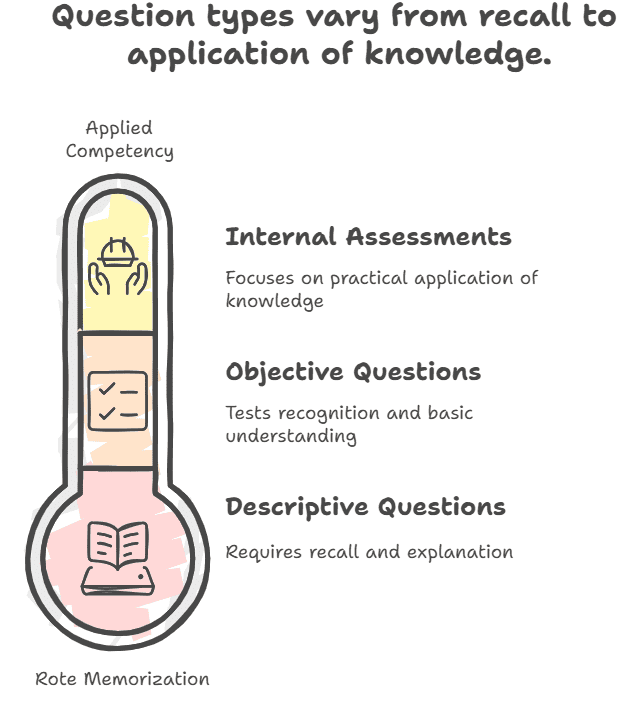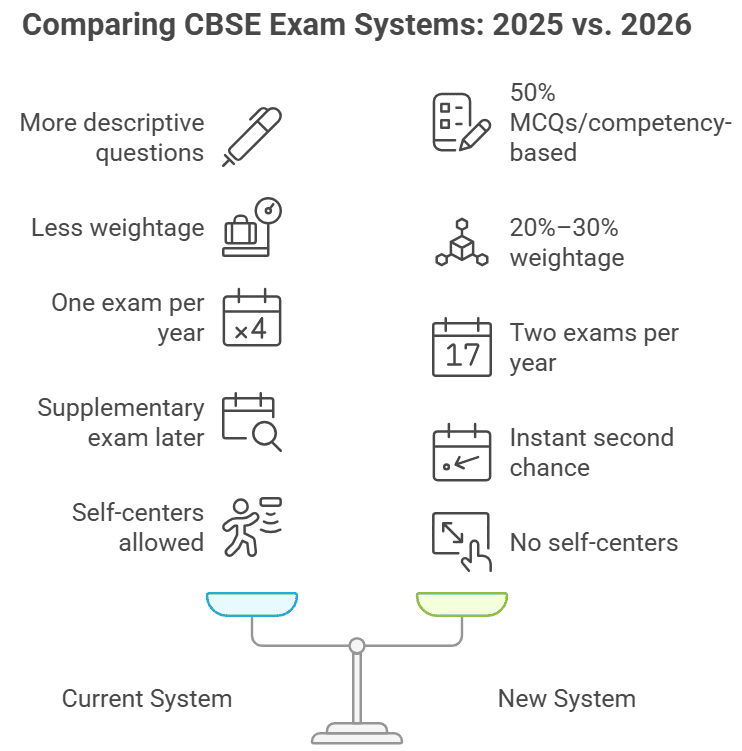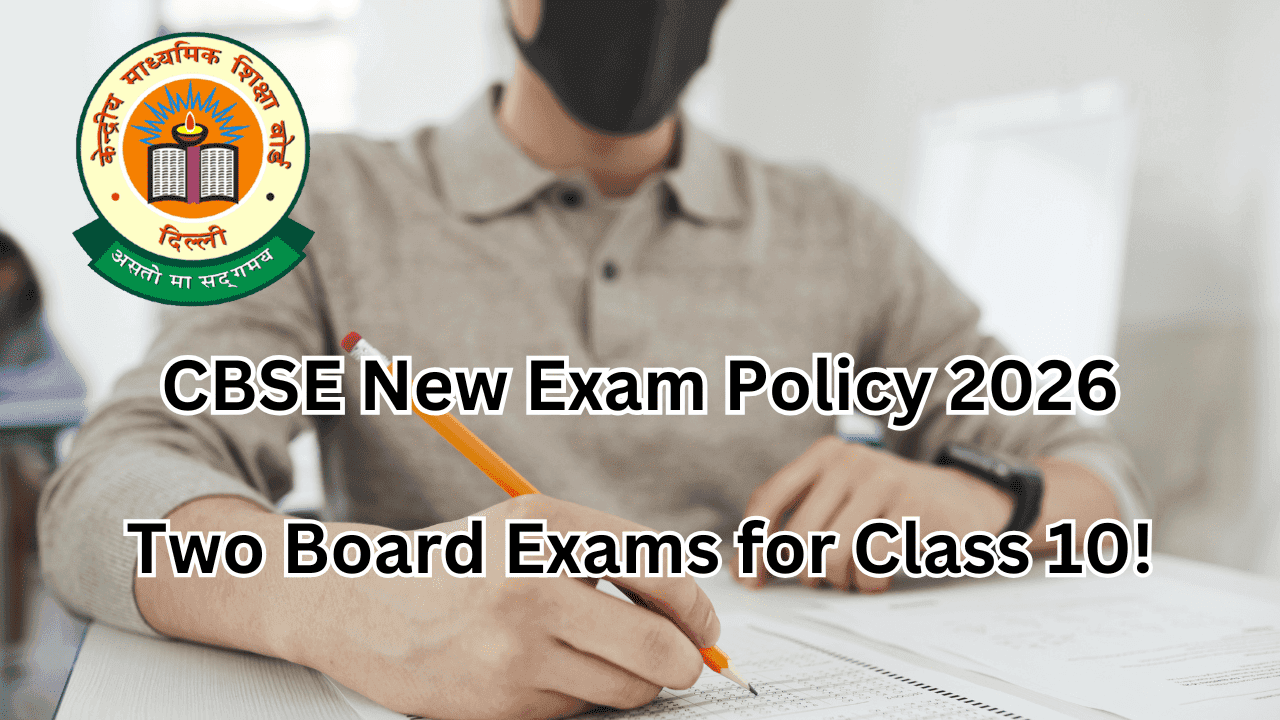The Central Board of Secondary Education (CBSE) has introduced a new examination policy for Class 10 students starting from 2026, aligning with the National Education Policy (NEP) 2020. This reform aims to reduce exam stress, encourage conceptual learning over rote memorization, and provide a competency-based assessment system. As per the official notification dated June 25, 2025, CBSE has confirmed the implementation of two board exams per year for Class 10 from 2025-26. This will offer students a main exam and an improvement exam opportunity. This blog breaks down the key changes in the exam pattern, question formats, internal assessments, and the two-exam system.
Key Changes in the CBSE Class 10 Board Exam 2026
1. Revised Exam Pattern: Focus on Competency-Based Learning
CBSE is shifting towards a more applied and conceptual approach for Class 10 board exams in 2026:
- Objective-Type Questions: Up to 50% of questions in most subjects will be multiple-choice questions (MCQs) or competency-based (e.g., case-based or source-based questions).
- Reduced Descriptive Questions: The weightage of long-answer questions will drop to 30%, encouraging deeper understanding over memorization.
- Internal Assessments: These will now contribute 20%–30% to the final grade and will focus on competency-based tasks like projects, lab work, and application-based activities.
- Digital Evaluation: CBSE will implement AI-supported on-screen marking for faster and fairer results.

This change ensures exams test real-world thinking skills, reducing reliance on rote learning.
2. Two Board Exams in a Year
As per the CBSE notification, Class 10 students will have the opportunity to give board exams twice a year starting 2026:
- First Exam (Main): Mid-February 2026
- Second Exam (Improvement): May 2026
- Best Score Considered: The higher score from the two attempts will be reflected in the final marksheet.
| Attempt | Exam Period | Result Date |
|---|---|---|
| First Exam (Main) | 17 Feb – 6 Mar 2026 | 20 April 2026 |
| Second Exam (Improvement/Compartment) | 5 May – 20 May 2026 | 30 June 2026 |
- Both exams will cover the entire syllabus.
- No third attempt will be allowed—only two full-board exams.
- Mandatory First Exam: All students must appear in the first exam.
- Improvement Eligibility: Students who pass the first exam can improve their performance in up to three subjects (Science, Mathematics, Social Science, or languages) in the second exam. Those with compartment results can also appear in the second exam under the Compartment Category.
- Eligibility Restrictions: Students missing three or more subjects in the first exam will be categorized as "Essential Repeat" and can only retake the exam next year in February. New students cannot register solely for the second exam.
- Special Categories: Sports students, winter-bound school students, and CWSN (Children with Special Needs) candidates will have flexibility in scheduling.
- Post-Result Facilities: Photocopy, verification, and re-evaluation will be available only after the second exam results.
- Class XI Admission: Students not qualifying in the main exam can get provisional admission, confirmed based on the second exam result.
| Scenario | Solution |
| Failed in the first exam | Appear in the second exam (May) |
| Want to improve marks | Take the second exam (May) |
| Skipped first exam | Cannot register for the second exam |
| Failed in both attempts | Must reappear next year as a private candidate |
3. Exam Schedule: Fixed vs. Flexible Subjects
CBSE will schedule exams differently based on the type of subject:
- Fixed Date Subjects (Single Day Exam)
- Mathematics
- Science
- Social Science
- English
- Hindi
These subjects will have only one exam date per attempt, similar to the traditional system.
- Flexible Schedule Subjects (Multiple Exam Dates)
- Regional & Foreign Languages (e.g., Sanskrit, French, Bengali)
- Vocational/Elective Subjects (e.g., IT, AI, Business Studies)
- Skill-Based Courses (e.g., Agriculture, Beauty & Wellness)
These will be conducted 2–3 times on different days per phase.
Students cannot choose the date—CBSE will assign it to manage logistics and prevent paper leaks.
Suppose 5 lakh students have opted for IT. Instead of conducting the exam on one day, CBSE may conduct it on three different dates. A student will be allotted only one of these dates, based on CBSE’s scheduling.

4. Syllabus and Assessment Details
- No Syllabus Change: The syllabus for 2026 remains the same as per current textbooks; only the assessment method is being updated.
- Practical/Internal Assessments: These will be conducted only once before the first exam, and the scores will carry forward if a student opts for the second exam.
5. Exam Centers & Fees (Proposed Draft Policy)
- No Self-Centers: Schools cannot host exams exclusively for their students. CBSE will assign centers to ensure fairness.
- Exam Fees: Fees for both exams must be paid in advance during LOC (List of Candidates) registration. No refunds are available if a student skips the second exam.
- LOC Rules: Mandatory for the first exam; a separate LOC for the second exam is required, but no new names can be added.
What This Means For:
- Students: Less stress with two attempts and a focus on understanding, but they must adapt to new question formats and meet eligibility rules.
- Parents: Higher upfront fees and the need to ensure timely LOC submission.
- Teachers: Extra effort in preparing students for new formats and managing two exam schedules.
Who Can Appear in CBSE Class 10 Board Exams 2026?
| Candidate Scenario | Eligible for First Exam (Mid-Feb 2026) | Eligible for Second Exam (May 2026) | Remarks |
|---|---|---|---|
| Regular student (2025–26 batch) registered via LOC | Yes | Yes (if appeared in 1st exam) | Officially registered Class 10 students; eligible for both exams if they appear in the first. |
| Failed in the first exam (2026 batch) | Yes (already appeared) | Yes | Must take the second exam to pass or improve; classified under Compartment Category. |
| Passed but wants to improve marks (2026 batch) | Yes | Yes | Can retake up to 3 subjects (Science, Math, Social Science, languages); best score counts. |
| Registered but skipped the first exam (2026 batch) | No | No | Not eligible for 2nd exam; placed in "Essential Repeat" category for next year’s Feb exam. |
| Wants to register directly for second exam | Not allowed | Not allowed | Fresh registration only permitted for the first exam; no new LOC additions for the second. |
| Failed both attempts (2026 batch) | (already attempted both) | (already attempted both) | Must reappear in 2027 as a private candidate; no further attempts in 2026. |
| Private candidate (Class 10 2024 or 2025 batch) | Yes (if registering afresh) | Yes (if appeared in 1st exam) | Must register anew through CBSE as a private candidate and follow the 2-exam rule. |
| 2025 batch failed in compartment/absent | Yes (as private candidate in 2026) | Yes (if they appear in first exam) | Can appear in 2026 under the new pattern, but must take both exams if eligible. |
| 2024 batch failed or could not pass in previous attempts | Yes (as private candidate) | Yes (if they appear in 1st exam) | Will follow the new 2-attempt system in 2026 upon fresh registration. |
| Winter-bound school students / CWSN / Sports quota | Yes (can choose Phase 1 or 2) | Yes (can choose Phase 1 or 2) | CBSE allows flexibility; sports students can shift subjects conflicting with events. |
Old vs. New Exam System
| Feature | Current (2025) | New (2026 Onward) |
|---|---|---|
| Exams per Year | 1 (Feb–Mar) | 2 (Feb–Mar & May) |
| Question Types | Mostly Descriptive | 50% Objective, 30% Descriptive |
| Internal Assessment | Less emphasis | 20–30%, Competency-Based |
| Improvement Option | July Supplementary | Second attempt in May |
| Practical Exams | Before main exam | Once before first exam |
| Self-Centers | Allowed | Not allowed |
| Marksheet | Final score from one attempt | Best of two scores shown |
| Result Timeline | April | April (1st), June (2nd) |

Pros & Cons of the New CBSE Exam Policy 2026
| Advantages | Challenges |
|---|---|
| Reduced exam stress with 2 chances | Higher workload for schools & evaluators |
| Better learning outcomes (less rote) | Higher upfront exam fees |
| Option to improve without losing a year | No subject changes after Sept registration |
| Timely results, faster digital evaluation | Scheduling complexity in flexible subjects |
Read the full official notification here:
Frequently Asked Questions (FAQs)
What types of questions will be in the 2026 exams?
Up to 50% will be MCQs or competency-based, 30% will be descriptive, and 20%–30% will come from internal assessments focused on application-based tasks.
Who is eligible for the second exam in May?
Students who appeared in the first exam can take the second exam for improvement (up to 3 subjects) or if they have a compartment result. Those missing three or more subjects in the first exam cannot appear.
Can I change subjects after registration (LOC)?
No, subject changes are not allowed after the LOC is submitted in September. However, students can choose to skip the first exam and take the subject in the second exam.
Will my school be my exam center?
No, CBSE has banned self-centers to ensure fairness. Students will be allotted exam centers based on CBSE’s evaluation.
Will the marksheet show both scores?
Yes, the final marksheet will display both scores, with the higher score counted. Passing and merit certificates are issued after the second exam.
What happens if I fail both exams?
If a student fails both attempts, they will have to reappear next year as a private candidate. There are no additional attempts beyond the two exams.
Can I appear only for the second exam?
No, fresh registration for the second exam is not allowed. Only students who took the first exam can appear for the second exam.
How will practical exams be conducted?
Practical and internal assessments will be conducted only once before the first exam. The same practical marks will be carried forward for the second exam.
Will there be any impact on Class 12 exams?
No, as of now, this two-board exam policy applies only to Class 10. Class 12 will continue with the existing one board exam system.
The new CBSE policy for 2026 is a significant shift for Class 10 students! With a focus on competency-based learning and confirmed two-exam opportunities, it reduces stress and offers a second chance at success. Plan ahead—finalize subjects by September 2025 and prepare for core subjects early. Parents, note the upfront fees, and teachers, prepare for extra scheduling. Stay tuned for any updates based on feedback. What do you think—game-changer or added effort? Let us know below!
Feel free to ask any doubts in the comment section.

But if a student dies wellin first attempt is it nesscary to do second attempt
I honestly think it’s a hassle, it’s basically torture if you see it from my perspective. they can’t really be expecting us to study for 5 months continuously for the same exam can they …i mean just imagine the child .they’ll internally lose it before they get to the second exam. sure it has its own benefits ,but the cons outweigh the pros by great extent. really hope cbse doesn’t implement this. as a fellow student of batch of 26 …..i hope i’m heard.